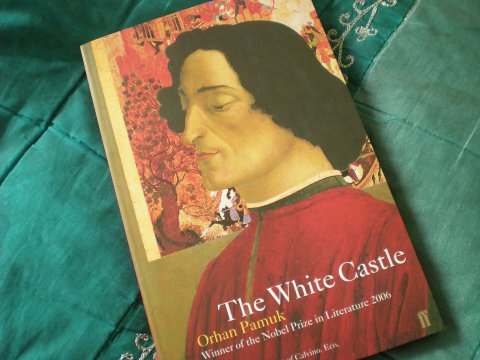
I know I haven’t written here too much about my Nobel-challenge, but here we go again! Let’s see, there’s so far 106 Nobel-winners and I have read 17 of them. And as we all know, by this time next year there will be 107 winners. I just wonder how many of them I have read by then…
Well, yes, I knew when I started this challenge that it would take time. Even if I would read one Nobel-winner per month it would take almost eight years to read them all through. And I can promise you, I will not read one Nobel-winner per month for the next eight years. But still it would be nice to move ahead with this challenge a little bit faster. At the moment I have in my bookshelf eight books from Nobel-winners just waiting to be read. I could at least try to read them, let’s say… during this year? Hmm, we’ll see. If that happens it would be cool, if not, well, I try again next year.
Anyway, here’s my latest Nobel-acquaintance: Orhan Pamuk! I read his book “The White Castle” (“Beyaz Kale”) already couple of months ago, but I’m still not sure what to think about this book. It reminded me very much of Umberto Eco and I do like Eco’s books a lot, but I still haven’t been able to read them all because, as fascinating as they can be, they can also be extremely boring and difficult to read. “The White Castle” was a little bit like that.
“The White Castle” takes place in the 17th century. It tells a story about a young Italian scholar who is on his way to Naples when pirates attack his ship. The Italian is captured and sold at the slave market in Istanbul and in the end man called Hoja becomes his master. Hoja is very interested about western science and asks young Italian to teach him everything he knows. Little by little they become closer and closer and in the end it is difficult to know which one is the master and which one is the slave.
I have a weakness for stories like this. I mean stories about scholars in the 17th century. I love the idea about monks and astronomers in their dark rooms trying to find out the secrets of the world. (You know what I mean, I LOVED “The Name of the Rose”!) So that part of this story I really liked: two guys trying to find out the limits of the science.
But unfortunately there was happening so much other stuff too in this book that I kind of lost the track. Or if I’m more honest, let’s put it this way: at the times this book was just really boring. I did like the idea and the story in the book and now when I think back I have to say that “The White Castle” was an interesting and cool book, but while I was reading it, it was not so easy to see the greatness of it all. Maybe it just wasn’t the right time. Maybe a book like this would need more time or just the better brains than mine. I’m glad that I read it, but I’m also glad that it’s over...
He emerged from his room well after midnight and like an embarrassed student needing help with some minor question that defeated him, sheepishly called me inside to the table. “Help me,” he said abruptly. “Let’s think about them together, I can’t make any progress on my own.” I was silent for a moment, thinking this had something to do with women. When he saw me look blank he said seriously, “I’m thinking about the fools. Why are they so stupid?” (Translated by Victoria Holbrook)
Kommentit
Tämän blogin kommentit tarkistetaan ennen julkaisua.